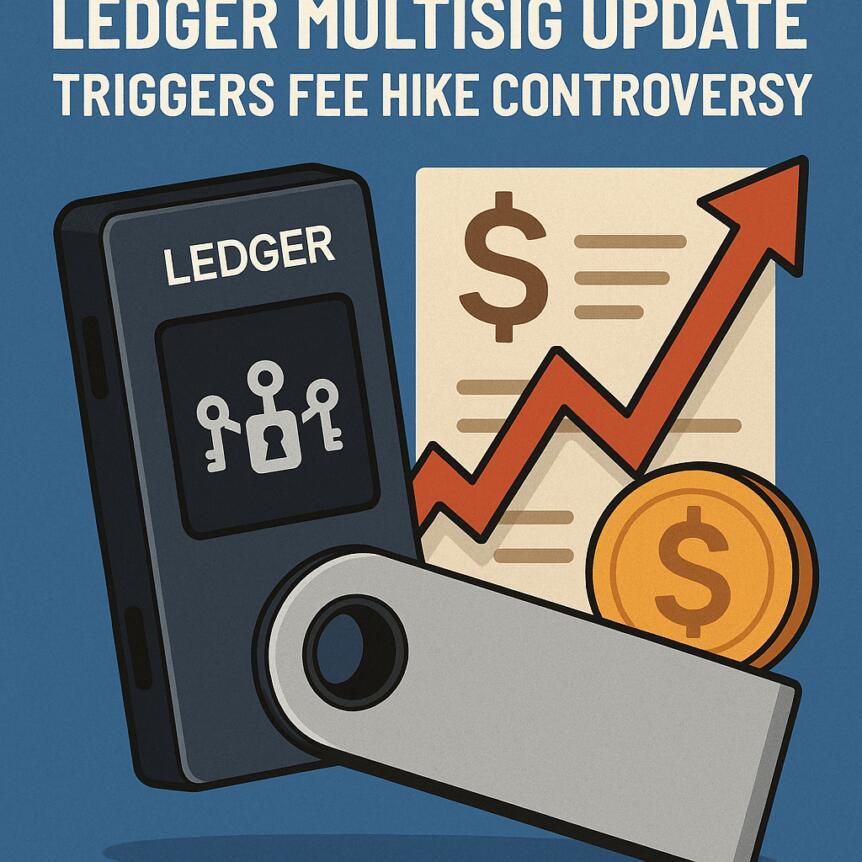
Ledger Multisig Update Triggers Fee Hike Controversy
- Ledger unveils a new multisig interface with a flat $10 fee per transaction, excluding token transfers which are charged at 0.05% of the transfer amount. The fee structure has met with criticism, with some users perceiving it as a cash grab amid ongoing efforts to improve security features. Company CEO Charles Guillemet clarified that multisig remains a paid service, despite earlier mentions suggesting it was free, prompting community scrutiny. Ledger maintains its position as the top hardware wallet provider, claiming to have sold 7.5 million devices and securing around 20% of the global market value. Experts continue to highlight the importance of physical security for crypto assets, while cautions remain about phishing and social engineering threats.
Ledger, one of the most prominent figures in the cryptocurrency storage industry, has announced the rollout of a new multisig interface designed to bolster security for user wallets. The update introduces a flat fee of $10 for all transactions, with the exception of token transfers, which incur a variable fee of 0.05%. These charges are in addition to the standard blockchain network gas fees, which remain independent of Ledger's pricing structure. While the new feature has been lauded as an important technical upgrade, it has also faced criticism over its fee policy, leading to debates about whether the company is prioritizing user safety or profit.
Adding to the controversy, discrepancies between Ledger CEO Charles Guillemet's statements and the company's official documentation were pointed out. Guillemet initially suggested that multisig features were free, but later clarified that it is a paid service, calling earlier comments a typo. This inconsistency has fueled further scrutiny from the community, which questions the transparency of Ledger's pricing and security strategy.
Source: pcaversaccioLedger's market dominance and security stanceLedger is widely regarded as the largest hardware wallet provider, having sold over 7.5 million devices during its decade of operation. Its wallets are alongside the most trusted in the industry, securing an estimated 20% of the global cryptocurrency market by value. Hardware wallets like Ledger are prized for allowing users to retain control over their private keys, aligning with core cryptocurrency ethos of decentralization and ownership.
Although Ledger boasts a stellar security record-reporting no breaches on its devices-security experts such as Kaspersky emphasize ongoing risks like phishing and social engineering. These attack vectors can bypass hardware security by deceiving users into revealing sensitive information, underscoring that physical safeguards are just one piece of the security puzzle.
As the industry continues to evolve, the ongoing debate around crypto wallet security, costs, and user trust remains at the forefront, highlighting the delicate balance between innovation and affordability in the expanding landscape of blockchain and cryptocurrency storage solutions.
Crypto Investing Risk WarningCrypto assets are highly volatile. Your capital is at risk. Don't invest unless you're prepared to lose all the money you invest.
Legal Disclaimer:
MENAFN provides the
information “as is” without warranty of any kind. We do not accept
any responsibility or liability for the accuracy, content, images,
videos, licenses, completeness, legality, or reliability of the information
contained in this article. If you have any complaints or copyright
issues related to this article, kindly contact the provider above.


















Comments
No comment